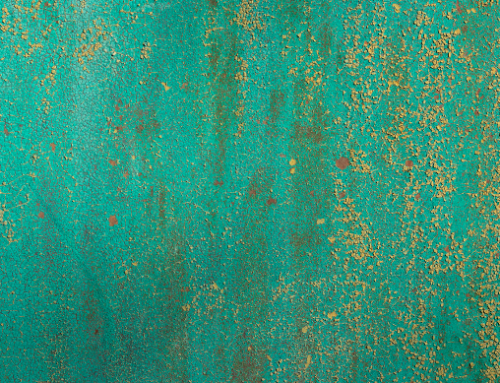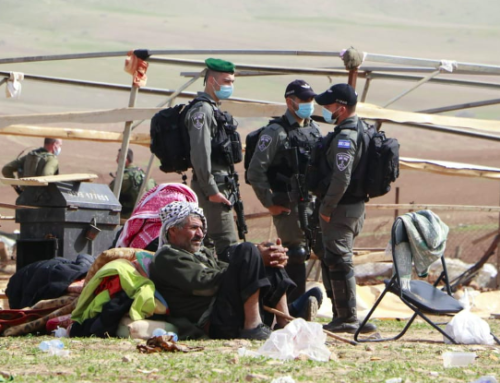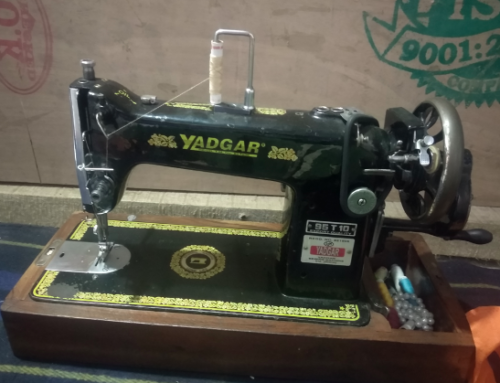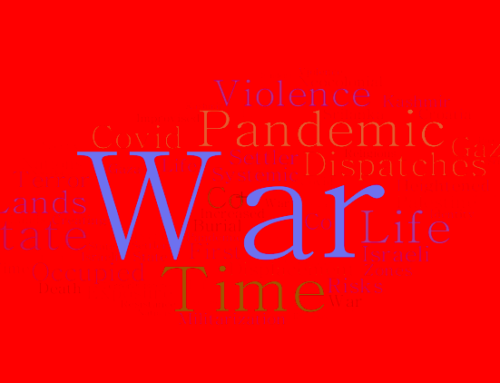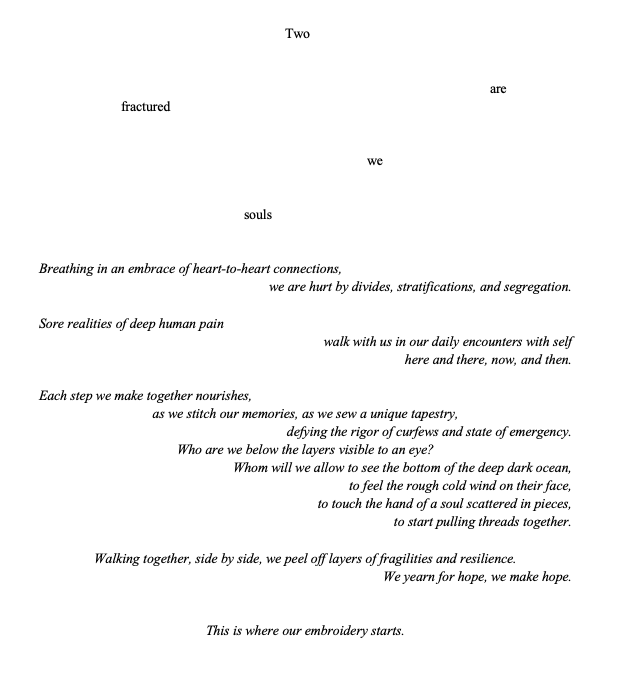
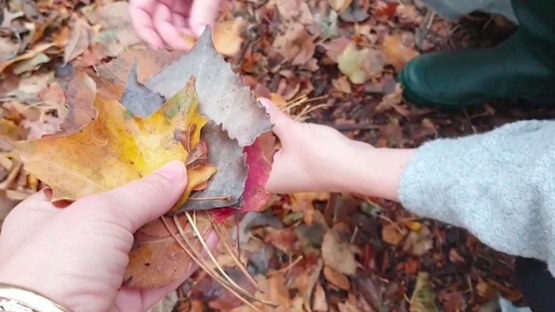
Walking in the woods in Željezara neighborhood in Sisak on a windy October afternoon in 2020. Photo by author.
Early memories and first embroideries
I met Aicha in my hometown of Sisak in central Croatia, just weeks after the COVID-19 pandemic swept the world. We took long walks together and our depths erupted as we shared our early childhood memories from refugee camps. Different times, locations, and wars, but similar genealogies brought our stories together. Closely tied to each other, our exchanges occurred between curfews but lived beyond (and in refusal of) social distance.
From our very first conversations together, I felt that our journey would be the intersecting kind. Our memories from refugee camps and schooling carried such resemblance that it made us write and speak to each other with a profound sense of relationality and reciprocity (Kimmerer 2013). This essay comes as a reflection of our encounters, and of our process of piecing together fragments of our experiences. Our journey of knitting these experiences together surfaced silenced epistemes, driven by the energies of co-weaving and embroidering. Our journey reflects the words of Collins:“Needlecraft metaphors offer another way of thinking about the creative and generative practice of writing – and about how we write in relation to particular knowledge claims and communities – that is more about piecing together fragments.”
Notes from our first walk on a cold Spring morning at the beginning of the COVID-19 pandemic in 2020, after the four week lock-down.
Aicha’s memory from a refugee camp in southern Turkey (2005-2012)
We came to Turkey from Aleppo as a family of seven. I was seven years old, and my two youngest twin sisters had just been born. For over four years we lived in a tent—there we slept, cooked, studied, played, talked. We then moved into a container, where we lived for the next three years. There was not much difference, we still slept on the floor. We had a good school in the camp; I liked it a lot. Many Syrian children were there, thousands. I mostly enjoyed spending time with the elders as I loved hearing their stories. And I used to tell stories, to the elders and to younger children alike. With their eyes and ears wide open, all the children and grownups would gather and listen to the wisdom shared through these centuries-old stories. Those years of storytelling in a hopeless container yielded much hope.
Emina’s memory from a refugee camp in Slovenia (1992)
I was holding a pink elephant in my hands. I could not tell if it was wooden or plastic. I held it obsessively, looking at its bright color, as the days passed in an overcrowded refugee camp. I held tightly to the elephant while gathering strength to suck in the gray walls with broken windows. My new home, for who knew how long. I cannot recall whether it was spring or fall but the days were grim and gray, with an occasional sun warming our cheeks and our under-dressed bodies. More than twenty-five years later, the pervasive chill still stays with me. The chill never abandoned me, nor did the memory of the old and wet walls covered in mold, the obnoxious smell of matresses and blankets, the appalling taste of cooked beans, or the lack of room to lay down and rest. I was afraid to close my eyes in that room, where the men devoured women and girls with their gaze and curled up next to my three sisters and my aunt. The words would dissipate as the mind went on unknown journeys. On these journeys, the pink elephant became a co-traveler, an omen of hope.
Aicha to Emina: This is the first time I have shared my story, as no one listens to me here. I need to be telling stories. That is my purpose. But no one listens to me here. These are rough times for my soul.
Emina to Aicha: Aicha, when you told me about your life in the refugee camp in southern Turkey, the chills and the pink elephant snuck in. Strong currents of memory always find their flow. The war lives in me, and I do not run away from it anymore. It comes after you, no matter what. Just like it did with the pandemic and the new state of emergency. We are again terrified of other humans and what they could do to us. Toni Morrison (1995, 99) writes the following:
All water has a perfect memory and is forever trying to get back to where it was. Writers are like that: remembering where we were, what valley we ran through, what the banks were like, the light that was there and the route back to our original place. It is emotional memory – what the nerves and the skin remember as well as how it appeared. And a rush of imagination is our flooding.
The social distance was not new to any of us. COVID-19 invoked painful memories of war, displacement, and survival in our hometown – a place that already bore stamps of grenade holes on facades and retained traces of bloodshed. The pandemic also revealed the continuity of pervasive wars against Muslim and refugee Others like Aicha, whose otherness was represented through her hijab, her language, her Muslim-ness and non-alike-ness.
Aicha to Emina: I am not going to [pharmacy] school anymore. Online schooling is only in Croatian. No one from school said anything except that I am no longer enrolled.
Aicha came from a refugee camp in Turkey only months before the COVID-19 surge. She was still learning the language. When schools switched to online learning, many refugee, migrant, Roma and other minoritized youth were cast out. The pandemic sharpened the teeth of Islamophobic, anti-migrant, and racist politics, all of which had long been present, turning migrants and refugees into security threats with every new state of emergency.
Aicha was able to enroll in her school again in September 2020, but she had to repeat the grade from which she had been expelled with no explanation during COVID-19. This time she knew the language better and had a better grasp of her environment.
An excerpt from a conversation on a windy October afternoon in 2020, four weeks after Aicha had returned to school:
Aicha and Emina:
No one on the bus wants to sit next to me because I wear a hijab. I get looks of suspicion; I see fear in their eyes. My teachers told me that school is too hard for me—that I can’t do well in school since I don’t speak the language. You know, I want to prove them wrong and show them I can speak this language. I mean, I speak Arabic and Turkish and other languages too.
I heard what you heard; I too was told that I would fail.
I heard from my classmates that I should take off the silly cover on my head. My teachers said that women in Europe are free. But how do I then feel imprisoned by hostility!? If women are free, why don’t they let me wear a hijab?
I heard that my name doesn’t belong here, either. They sent us away too many times!
At the end of the school year, in July of 2021, Aicha was diagnosed as having intellectual disabilities and emotional issues. This devastated her and threatened to take away her dreams and future possibilities. Stemming from eugenics and scientific racism, diagnoses like these are racialized technologies that are frequently mobilized against Romani students in Croatia. Currently, these diagnoses are being used against refugee youth who are in the process of learning Croatian. The war and the pandemic conflated in this place; the state apparatus used COVID-related policies to fortify anti-refugee warfare by fuelling racism and turning refugees and migrants into enemies.
As Aicha and I walked together on the chilly October Sunday morning, she shared with me the following: I would like to tell you my dreams. Look at what I recently published on Facebook!”
I will become a pharmacist! I will run a pharmacy, but not just any pharmacy. My pharmacy will give away boxes of smiles and bottles of joy. I will place on pharmacy shelves everything human souls long for. Hope pills, love tablets, and happiness concoctions for the everlasting effect. I will also add a lotion for releasing pain so everyone can find their inner piece at every hour of a day. And a magical potion for overcoming distance and reducing yearning. My pharmacy will be an asylum for the poor, cast out and sick. And I will make a special chocolate with strawberries for kids so their happiness always stays. 😇
I will be a different, unparalleled pharmacist. 💙
Hope is her power. Hope is in stories. Telling stories and sharing them became a pressing need for both of us, a way to sharpen our individual and collective commitment to resisting injustice. It became a way for us to both nourish and imagine a different world. Morrison (1995, 98) poignantly asserts that “the act of imagination is bound up with memory.” The journey Aicha and I shared laid the foundation for a politics of hope. We came into a place of epistemic wholeness (Conolly-Schaffer 2012), even amidst the devastating earthquakes that occurred in Sisak in late December 2020, and that caused our homes to crumble. This, too, threw us back into displacement, seeking refuge and recalling memories of war, just as the pandemic had only months before. Our storytelling journey was both an ethico-political commitment and the journey that got us through the perpetual loss of home we experienced on these tempestuous terrains of social distancing, curfews, and earthquakes.
This essay is part of a series that reflects upon my conversations with Aicha. Alongside this essay, another piece, titled “Collaborative (Re)search of Epistemic Wholeness,” was published in the journal Reconsidering Development. The third piece is a digital performance experimenting with the red thread methodologies, an emergent project between four decolonial feminists and journal AGITATE! Unsettling knowledges.
References
Connolly-Shaffer, Patricia K. 2012. “Staging Cross-Border (Reading) Alliances: Feminist Polyvocal Testimonials at Work.” ProQuest Dissertations Publishing.
Kimmerer, Robin Wall. 2020. Braiding Sweetgrass: Indigenous Wisdom, Scientific Knowledge, and the Teachings of Plants. Second hardcover edition. Minneapolis, Minnesota: Milkweed Editions, 2020.
Morrison, Toni. 1987. “Site of Memory.” In Inventing the Truth: the Art and Craft of Memoir, edited by Baker, Zinsser, Baker, Russell, and Zinsser, William, 83-102. Boston: Houghton Mifflin.
Emina Bužinkić is an activist, scholar, and writer from the Balkans laboring at the intersections of migration, education, and globalization. She engages with anti-militaristic, anti-capitalist, and anti-racist political praxes. Her work is inspired by migrants’ everyday struggle for freedom and epistemes emerging from transnational and decolonial feminism, critical border activism, and collective knowledge production. She is a member of AGITATE! Unsettling knowledges Editorial Collective and Transbalkan Solidarity collective. She recently earned her Ph.D. from the University of Minnesota with her research focusing on the ideological displacement of refugees and migrants from schooling and social sites by the deployment of border(lining) politics. Emina has recently started her postdoctoral fellowship with a Croatian based Institute for Development and International Relations. Emina’s work has been published in international journals focusing on education, critical youth studies, critical refugee and migration studies, and critical anthropology.
Cite As: Bužinkić, Emina. 2023. “Weaving Fractured Memories: Defying curfews and perpetual wars” In “Pandemic War-Time: Dispatches from Occupied Lands” edited by Ather Zia, American Ethnologist website, September 26 2023, [https://americanethnologist.org/news/weaving-fracture…y-emina-buzinkic/ ]
